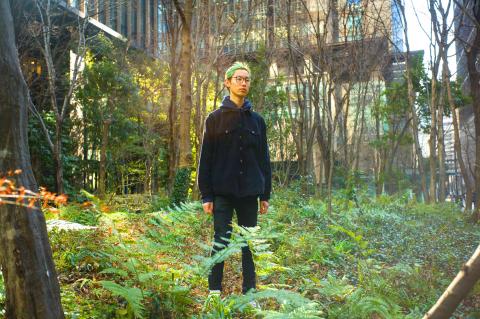Young climate activists in Asia are changing tactics, filing lawsuits and developing coordinated online protests, a shift that is accelerating as leaders urge people to avoid public gatherings because of the spread of the coronavirus.
In Japan, students earlier this month protested in the streets outside a bank that funds coal projects.
Now, Isao Sakai, one of the founding members of Fridays for Future Tokyo, said the group is working on ways to develop effective online campaigns.

Photo: Bloomberg
“We are considering shifting our strategy to more online action” because of the virus, Sakai, 19, said by telephone yesterday.
However, “if things do not get worse, our intention is we want to do a strike,” he said.
This month, Swedish youth climate protest leader Greta Thunberg, who started the Friday strike student street protest movement, urged young activists to avoid crowds because of the virus.
In South Korea, high school senior Kim Yu-jin and 29 other young campaigners are suing the South Korean government in court to push for more aggressive emission-reduction targets.
Kim’s group canceled a plan for a protest in front of the city hall in Seoul on Friday, the day it submitted the complaint to the Constitutional Court, because of the virus.
The group instead is getting signatures online and asking people to retweet and share social-media posts. During the Friday briefing, the students were all wearing facial masks.
“We want drastic change,” said Kim in Seoul, whose case argues that South Korea’s pledge to reduce emissions almost a quarter by 2030 from 2017 levels is far below what is required to meet the Paris Agreement.
“We did what we could to make changes by meeting government officials,” she said. “It wasn’t enough to make the political leaders implement better policies.”
In Tokyo, Sakai’s group protested on March 6 outside the headquarters of Mizuho Financial Group, a large coal financier.
When he tried to deliver a video to Mizuho president Tatsufumi Sakai, he was turned away by security guards. Mizuho declined to comment.
The video showed Japanese students with homemade cardboard signs, many filmed at home, imploring the bank to halt its support for the fossil fuel.
“Some adults say our efforts to reduce greenhouse gas emissions will hurt economic growth, but this way of thinking is very outdated,” Kim said. “If we actively respond to the changing climate, it can help us be more sustainable, which in turn will help boost the economy.”
Her message to deepen carbon cuts echoes a report from UN Environment Programme in November last year that said nations must halve their 2018 pollution levels by 2030 to meet the climate pact goal of limiting heating to 1.5?C.
South Korea has revised down its emission reduction targets twice since 2010.
Youth climate groups from India to New Zealand have sought to file lawsuits against governments.
“Young people and lawsuits — I know these words don’t go together,” Kim said.
However, “young people are the ones who will have to survive through the threat of climate change,” she said.

POLITICAL PRISONERS VS DEPORTEES: Venezuela’s prosecutor’s office slammed the call by El Salvador’s leader, accusing him of crimes against humanity Salvadoran President Nayib Bukele on Sunday proposed carrying out a prisoner swap with Venezuela, suggesting he would exchange Venezuelan deportees from the US his government has kept imprisoned for what he called “political prisoners” in Venezuela. In a post on X, directed at Venezuelan President Nicolas Maduro, Bukele listed off a number of family members of high-level opposition figures in Venezuela, journalists and activists detained during the South American government’s electoral crackdown last year. “The only reason they are imprisoned is for having opposed you and your electoral fraud,” he wrote to Maduro. “However, I want to propose a humanitarian agreement that

ECONOMIC WORRIES: The ruling PAP faces voters amid concerns that the city-state faces the possibility of a recession and job losses amid Washington’s tariffs Singapore yesterday finalized contestants for its general election on Saturday next week, with the ruling People’s Action Party (PAP) fielding 32 new candidates in the biggest refresh of the party that has ruled the city-state since independence in 1965. The move follows a pledge by Singaporean Prime Minister Lawrence Wong (黃循財), who took office last year and assumed the PAP leadership, to “bring in new blood, new ideas and new energy” to steer the country of 6 million people. His latest shake-up beats that of predecessors Lee Hsien Loong (李顯龍) and Goh Chok Tong (吳作棟), who replaced 24 and 11 politicians respectively

Young women standing idly around a park in Tokyo’s west suggest that a giant statue of Godzilla is not the only attraction for a record number of foreign tourists. Their faces lit by the cold glow of their phones, the women lining Okubo Park are evidence that sex tourism has developed as a dark flipside to the bustling Kabukicho nightlife district. Increasing numbers of foreign men are flocking to the area after seeing videos on social media. One of the women said that the area near Kabukicho, where Godzilla rumbles and belches smoke atop a cinema, has become a “real

‘WATER WARFARE’: A Pakistani official called India’s suspension of a 65-year-old treaty on the sharing of waters from the Indus River ‘a cowardly, illegal move’ Pakistan yesterday canceled visas for Indian nationals, closed its airspace for all Indian-owned or operated airlines, and suspended all trade with India, including to and from any third country. The retaliatory measures follow India’s decision to suspend visas for Pakistani nationals in the aftermath of a deadly attack by shooters in Kashmir that killed 26 people, mostly tourists. The rare attack on civilians shocked and outraged India and prompted calls for action against their country’s archenemy, Pakistan. New Delhi did not publicly produce evidence connecting the attack to its neighbor, but said it had “cross-border” links to Pakistan. Pakistan denied any connection to